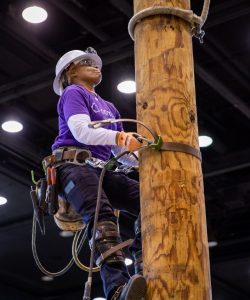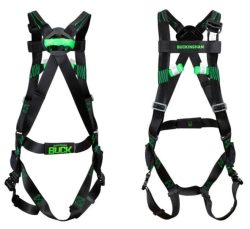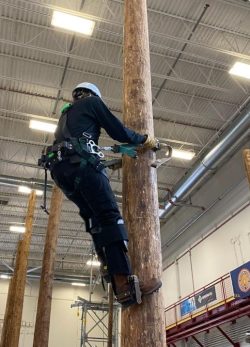
Across the country, when an electric line is down or a transformer needs work, the crews that come out to work overhead have typically been made up of men. But as ComEd works to build a more diverse talent pipeline to support the clean energy transition in Illinois, more women are coming onto the job site, prompting a deeper look at how safety gear can be better built to suit different sized frames.
 Later this year, ComEd will roll out new safety protection to accommodate female climbers. Ill-fitting gear can impact employees’ safety, as crews working overhead must be equipped with several pieces of safety equipment — including a hardhat, body belts, and “climbers”, stirrups with gaffs that enable them to ascend, descend, or secure their position on a pole. A properly worn pair of climbers extend from the instep to below the knee, and climbing boots should fit snuggly in the stirrups.
Later this year, ComEd will roll out new safety protection to accommodate female climbers. Ill-fitting gear can impact employees’ safety, as crews working overhead must be equipped with several pieces of safety equipment — including a hardhat, body belts, and “climbers”, stirrups with gaffs that enable them to ascend, descend, or secure their position on a pole. A properly worn pair of climbers extend from the instep to below the knee, and climbing boots should fit snuggly in the stirrups.
The perfect fit can be difficult to achieve for people below 5’5” in height and with smaller or narrower feet. Since average height for a man is 5’9” and a woman is 5’3½” it’s more likely that women will have fit issues. Another key piece of safety equipment is the body belt that goes around line workers’ hips for support while off the ground. This belt has been designed for the male body since its introduction more than a century ago, even as other enhancements were introduced to improve comfort and safety.
The challenges of fitting female overhead apprentices to safety equipment that will properly secure them during training and on the job became evident to Tim Griffin, a training instructor at ComEd’s Chicago Training Center.
“I noticed some female overhead students having difficulty with keeping the body belt in the desired location while ascending and having loose-fitting climbers,” recalled Tim. “As we recruit and train more people to join the clean energy workforce, we need to innovate our equipment to accommodate a growing number of workers with varying body types to ensure the safety of anyone who is interested in becoming a line worker.”

ComEd’s Safety and Fall Protection team and equipment vendor, Buckingham, collaborated to pilot new climbers and a 2-in-1 body harness-belt. The new harness combines shoulder and leg straps to ensure a secure hold on the worker while high up, and the new climbers are shorter with narrower stirrups. Female overhead apprentices, who began testing the prototypes in August of 2023, have shared positive feedback about the new equipment. And while this equipment was developed to address a problem for women who work in overhead, offering a diverse range of equipment that comfortably supports workers of all sizes and body types is a win for all line workers.
“When I started the initial overhead qualification school, I was so small I couldn’t fit into the company-approved belts,” recalled Asianay Johnson, overhead basic school apprentice. “That was when I was introduced to the harness. It allowed me to become more comfortable and confident in my climbing abilities. ComEd is leveling the playing field to career success in the overhead world by making the necessary modifications so that anyone, regardless of age, shape or size, can excel at being a proficient climber. The gender wall is coming down, and I look forward to seeing more women enter this line of work.”
 ComEd commissioned the new climbers last year from Buckingham and has since received several sets for trainees across ComEd’s overhead training sites. The 2-in-1 harness is being created to suit people sizes S up to XL and is expected to be available for use by ComEd employees in the near future.
ComEd commissioned the new climbers last year from Buckingham and has since received several sets for trainees across ComEd’s overhead training sites. The 2-in-1 harness is being created to suit people sizes S up to XL and is expected to be available for use by ComEd employees in the near future.
To ensure more members of our diverse communities have access to the growing construction and utility fields, ComEd works to expand career pathways through a wide range of education and training programming – including all-female climbing schools. Last year alone, 1,200 residents, including women, benefitted from ComEd workforce development and apprenticeship-style programs. Learn more about entry-level trades roles or other ComEd training programs by visiting www.ComEd.com/CleanEnergyJobs.
